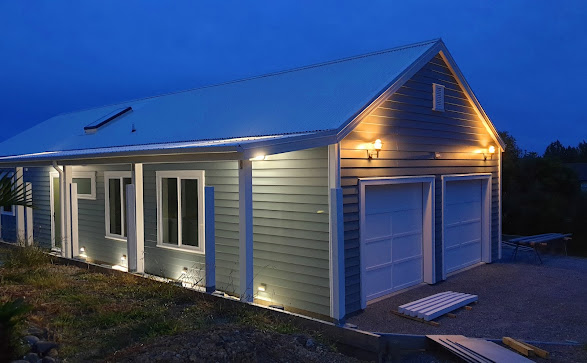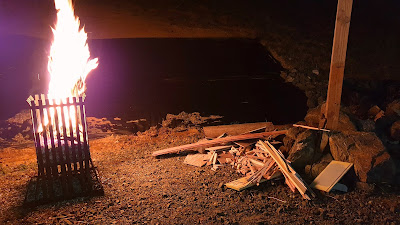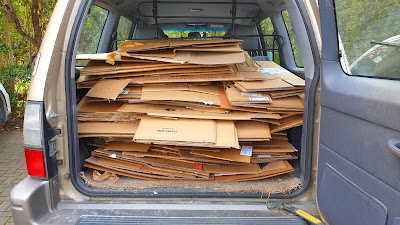Kingfisher Cottage in 2020 Our attempt at a zero-waste build
I was once told that ‘there is no such thing as a zero waste build’.
In 2020 we were faced with
building our third home in 5 years. We were uneasy about the level of waste in
our first two despite reassurances from the building company that waste was normal and unavoidable. Despite this we decided to ‘have a go’ at reducing
waste and recycling as much as possible. Even if we couldn’t reach zero – we
should certainly do better and learn something in the process. We certainly did
learn a lot and we believe that everyone should have a go at this to some degree
if they can!
building our third home in 5 years. We were uneasy about the level of waste in
our first two despite reassurances from the building company that waste was normal and unavoidable. Despite this we decided to ‘have a go’ at reducing
waste and recycling as much as possible. Even if we couldn’t reach zero – we
should certainly do better and learn something in the process. We certainly did
learn a lot and we believe that everyone should have a go at this to some degree
if they can!
Background
We live on just over 1.6 hectares of land. We had always planned
to build a barn next to the cottage, but two years ago, my elderly mother started to
need more support and we decided to build her a home on the platform next to
Kingfisher Cottage.
to build a barn next to the cottage, but two years ago, my elderly mother started to
need more support and we decided to build her a home on the platform next to
Kingfisher Cottage.
In November 2019
we signed a contract with the builder and we specified that there would be no
provision for skips or bins for building waste on site. We said that we would take responsibility for all rubbish disposal.To say that the builder was skeptical
would be an understatement! We were determined to have a go.
we signed a contract with the builder and we specified that there would be no
provision for skips or bins for building waste on site. We said that we would take responsibility for all rubbish disposal.To say that the builder was skeptical
would be an understatement! We were determined to have a go.
Our experience of bins onsite
Our previous experience of bins had been bad; we believe they actually
encourage more waste. Each previous build had at least two bins provided for the duration. We
noticed that people regularly trawled the area to find somewhere to dump their
rubbish and it often found its way into our bin! Even when we built away from the road, we
arrived on site one morning to find a double bed mattress in our bin!
encourage more waste. Each previous build had at least two bins provided for the duration. We
noticed that people regularly trawled the area to find somewhere to dump their
rubbish and it often found its way into our bin! Even when we built away from the road, we
arrived on site one morning to find a double bed mattress in our bin!
We
also noticed, apart from the cost of other people’s rubbish, contractors would
regularly toss unused products and off-cuts straight in the skip because it was easy to do. We found ourselves ‘bin diving’ more than once to retrieve
perfectly useful materials that could be re-used or re-purposed. It all went to
landfill. It was frustrating.
also noticed, apart from the cost of other people’s rubbish, contractors would
regularly toss unused products and off-cuts straight in the skip because it was easy to do. We found ourselves ‘bin diving’ more than once to retrieve
perfectly useful materials that could be re-used or re-purposed. It all went to
landfill. It was frustrating.
How did we do it?
It was time consuming and
sometimes hard work – but it worked well.
sometimes hard work – but it worked well.
- We asked the builder to put all
rubbish in a pile by the gate and agreed that anything that was not in the pile
was theirs to be used later in the build. We also kept theirs in a tidy stack. This system worked well as the contractors simply used the pile by the gate as if it were the normal bin.
- At the weekend we would divide the waste into piles: Metal, treated
timber, untreated timber, plasterboard, tiles, cardboard and plastic (mainly packaging). Then these were ready sorted
for:
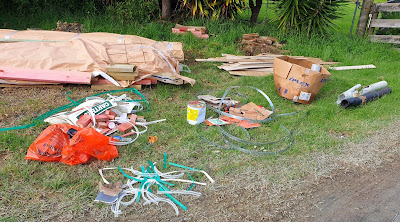 |
| Sorting into piles at the weekend |
1. Re-using. We now have a huge pile of timber, piling off-cuts and roofing
to use in future garden projects. Untreated timer is being kept for firewood or
lining the bottom of raised planters.
to use in future garden projects. Untreated timer is being kept for firewood or
lining the bottom of raised planters.
2. Burning. Timber off-cuts that we
couldn’t use were cut up and burned in a brazier. We also
burned small, unusable pieces of Gibb and plasterboard. We made sure that there
was no wind and stayed well away.
couldn’t use were cut up and burned in a brazier. We also
burned small, unusable pieces of Gibb and plasterboard. We made sure that there
was no wind and stayed well away.
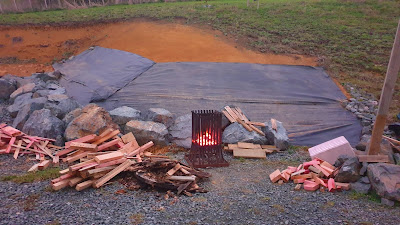 |
| Piles of timber for burning |
3. Wastebusters. We are lucky enough to have a
community waste business here and we knew that they would be careful about
disposing of our small amount of residual waste. This was our only cost – and we
tried to minimise it by sorting well before we took it there. Sometimes there was a lot and it took a few hours – at other times
there was less. We had a discipline of always clearing it by the start of a new
week.
community waste business here and we knew that they would be careful about
disposing of our small amount of residual waste. This was our only cost – and we
tried to minimise it by sorting well before we took it there. Sometimes there was a lot and it took a few hours – at other times
there was less. We had a discipline of always clearing it by the start of a new
week.
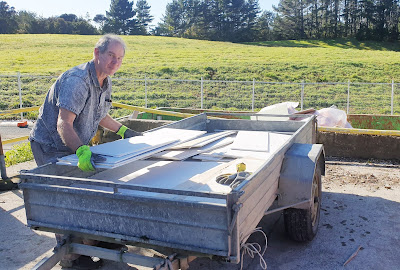 |
| Unloading fiber board at the Wastebusters recycling centre |
Unexpected outcomes
• Our building company started to question waste
themselves. The company and its ‘subbies’ became much more unwilling to leave perfectly good
materials when we were taking them to use. We saw them putting left over
materials into their Ute more than once!
themselves. The company and its ‘subbies’ became much more unwilling to leave perfectly good
materials when we were taking them to use. We saw them putting left over
materials into their Ute more than once!
• Sub-contractors stopped leaving (and
bringing) their rubbish when it was more visible to us!
bringing) their rubbish when it was more visible to us!
• We reclaimed a huge
value of re-usable materials for our home
value of re-usable materials for our home
• We were surprised to see just how
much waste was in packaging. Everything seemed to come in Polystyrene with plastic
strapping around the box. Lights, kitchen equipment, tiles, some timber, roofing
…
much waste was in packaging. Everything seemed to come in Polystyrene with plastic
strapping around the box. Lights, kitchen equipment, tiles, some timber, roofing
…
• We found that there are always people who need something that you consider
to be rubbish! I would often advertise things on the local Facebook page and
they were claimed by those who could use them!
to be rubbish! I would often advertise things on the local Facebook page and
they were claimed by those who could use them!
• We made very few trips to the
refuse and re-cycling centre (Waste busters) and took everything in the rear of
our 4 wheel drive. The total cost was around $150.
refuse and re-cycling centre (Waste busters) and took everything in the rear of
our 4 wheel drive. The total cost was around $150.
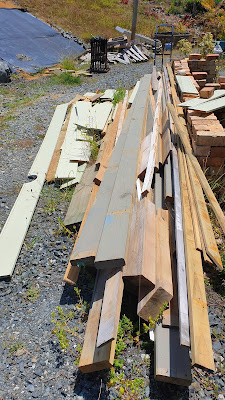 |
| Timber for future landscaping and building |
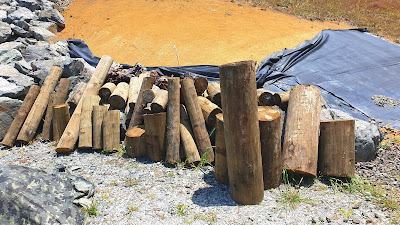 |
| Retaining off cuts very useful for other landscaping plans! |
Conclusion
On our
subdivision, we had seen builders deal with waste in different (all bad) ways.
Apart from the ubiquitous bin, a well-known local builder regularly piled up
rubbish (including plastics) and burnt it. This is horrible and we had to deal
with the toxic drift when houses around us were being built. When burning was
not easy, we saw the same builder dig a deep hole in the garden of the property
and bury a mixed load of waste onsite. The owners still have not discovered this
and maybe they never will! We have no idea how many other builders do this to
save time and money.
subdivision, we had seen builders deal with waste in different (all bad) ways.
Apart from the ubiquitous bin, a well-known local builder regularly piled up
rubbish (including plastics) and burnt it. This is horrible and we had to deal
with the toxic drift when houses around us were being built. When burning was
not easy, we saw the same builder dig a deep hole in the garden of the property
and bury a mixed load of waste onsite. The owners still have not discovered this
and maybe they never will! We have no idea how many other builders do this to
save time and money.
So apart from saving money, we feel good that we built in a
responsible way. Construction waste is a huge problem. Most builders focus on
the build and not the environmental impact of their construction. This is not
surprising because they are in business. Builders told me that the costs of
building would rise even more if they had to manage without a bin. Waste
management would be a cost to them and they would have to pass onto the
customer. Well for those who can do what we did, the cost is actually less.
responsible way. Construction waste is a huge problem. Most builders focus on
the build and not the environmental impact of their construction. This is not
surprising because they are in business. Builders told me that the costs of
building would rise even more if they had to manage without a bin. Waste
management would be a cost to them and they would have to pass onto the
customer. Well for those who can do what we did, the cost is actually less.
We
understand that many people just don’t have the time to do what we did… and I
can’t say it was easy! But if a few more people did it, we might just change the
throw away culture of the building industry. In the meantime, any amount of
re-cycling would help. We customers need to drive this movement because the building
industry as a whole won’t. Find a waste-conscious builder (there are a few of
them around – ask for a recommendation) or do what we did and introduce them to
a new way. You never know…!
understand that many people just don’t have the time to do what we did… and I
can’t say it was easy! But if a few more people did it, we might just change the
throw away culture of the building industry. In the meantime, any amount of
re-cycling would help. We customers need to drive this movement because the building
industry as a whole won’t. Find a waste-conscious builder (there are a few of
them around – ask for a recommendation) or do what we did and introduce them to
a new way. You never know…!

